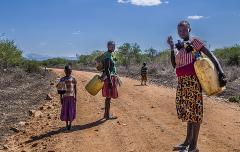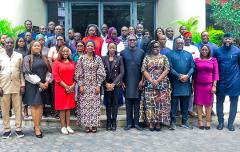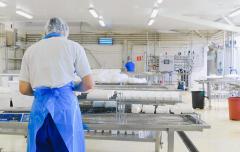New Chilling Prospects report shows lack of cooling access threatens health, prosperity and the climate
Report reveals major risks to vulnerable populations and global economy if investment and greater action not taken on access to sustainable cooling solutions
NEW YORK, July 16, 2018: Sustainable Energy for All (SEforALL) today released Chilling Prospects: Providing Sustainable Cooling for All – the first ever report to quantify the growing risks and assess the opportunities of the global cooling challenge.
The report shows there are over 1.1 billion people globally who face immediate risks from lack of access to cooling. Cooling underpins the ability of millions to escape poverty, to keep our children healthy, vaccines stable, food nutritious, and our economies productive. Access to cooling is now a fundamental issue of equity, and as temperatures hit record levels, this could also mean the difference between life or death for some.
These risks are both a development and climate change issue, as they pose challenges for the health, safety, and productivity of populations across the world – especially countries in Asia and Africa where access gaps are the largest. Yet this challenge also offers business and entrepreneurs the opportunity of major new consumer markets which want super-efficient, affordable technologies to meet their cooling needs.
“In a world facing continuously rising temperatures, access to cooling is not a luxury – it’s essential for everyday life. It guarantees safe cold supply chains for fresh produce, safe storage of life-saving vaccines, and safe work and housing conditions,” said Rachel Kyte, CEO and Special Representative to the United Nations Secretary-General for Sustainable Energy for All.
“This Chilling Prospects report is a wake-up call. We must meet these needs in an energy efficient way, and without using ozone damaging substances. If not, the risks to life, health and the planet are significant. But there are equally important business opportunities for those that face up to the challenge and act early.”
Closing these cooling access gaps is essential for economic growth and development for many countries, and especially vulnerable populations. Key findings based on an analysis of 52 vulnerable countries in hot climates include:
- 1.1 billion people face cooling access risks, including:
- 470 million people in poor rural areas without access to safe food and medicines
- 630 million people in hotter, poor urban slums with little or no cooling to protect them against extreme heatwaves
- Nine countries have the biggest populations facing significant cooling risks. These countries across Asia, Africa and Latin America include: India, Bangladesh, Brazil, Pakistan, Nigeria, Indonesia, China, Mozambique and Sudan.
- 2.3 billion people represent a different kind of cooling risk – a growing middle class, where limited purchasing options mean they may only be able to afford to buy less expensive and less efficient cooling devices, which could spike global energy demand with profound climate impacts.
It is also estimated that cooling is now responsible for about 10% of global warming and growing rapidly. Future choices about refrigerants, the efficiency of cooling technologies, and how cooling is powered will have a significant impact on achieving the Paris Climate Agreement. Previous research indicates that by 2050, work hour losses by country due to excessive heat and lack of access to cooling are expected to be more than 2% and a high as 12%.
With the destructive effects of climate change now being widely felt, Chilling Prospects issues an urgent call- to-action and specific recommendations to government policy-makers, business leaders, investors and civil society to increase access to sustainable cooling solutions for all.
Specific report recommendations include:
- Government policymakers should immediately measure gaps in access to cooling in their own countries, as an evidence base for more proactive and integratedpolicy-making.
- Businesses, governments and finance actors should collaborate to assess and act on the enormous commercial and economic opportunities, including productivity, employment and growth gains from providing sustainable cooling solutions for all.
- Manufacturers, industry associations and lenders should actively engage and cooperate develop products and financial solutions that meet the needs of those without access cooling.
- All stakeholders should accelerate their innovation efforts and embrace a paradigm shift - thinking more holistically about the way we provide cooling, focusing firstly on reducing heat loads and then about how deliver cooling affordably andsustainably.
Chilling Prospects is being launched during this week’s United Nations High-Level Political Forum, which is reviewing progress towards several of the Sustainable Development Goals (SDGs), including SDG7 - access to affordable, reliable, sustainable and modern energy for all. Meeting these growing cooling demands with clean and sustainable options for everyone is critical to support global energy goals.
The report was produced in partnership and supported by the Kigali Cooling Efficiency Program (K-CEP). Charlotte Pera, President & CEO of Climate Works Foundation, said: “Universal access to efficient, clean cooling is a huge prize for people and the planet, and can help achieve the SDGs. The launch of ‘Chilling Prospects’ is a big step toward that prize. Through the Kigali Cooling Efficiency Program, we look forward to supporting this crucial effort in partnership with health communities, businesses, and governments in the developing world. It is only through collaboration—across public, philanthropic, and private sectors—that we will succeed in tackling climate change and creating a prosperous future for all.”
Also commenting on the report, Jürgen Fischer, President Danfoss Cooling and industry representative in the Cooling for All Global Panel, said: “Industry is ready for sustainable cooling. Energy-efficient and low global warming potential technology is available today and needs to be implemented globally. Therefore, we are pleased to help shed light on the importance of worldwide access to sustainable cooling. Through continued investment in innovation, best-in-class technology can help solve some of the world´s biggest problems starting today.”
Sustainable Energy for All produced the report as part of the Cooling for All initiative, which developed the report along with contributions from the Global Panel on Access to Cooling. The report draws attention to the direct intersection between three internationally agreed goals: the Paris Climate Agreement; the Sustainable Development Goals; and the Montreal Protocol’s Kigali Amendment. One of the key goals of the Kigali Amendment is to limit consumption and production of hydrofluorocarbons (HFCs), a potent greenhouse gas used widely in air conditioners and refrigerators.
For more information, please visit our website here or follow the conversation online using #CoolingforAll.
Read the report in full here




